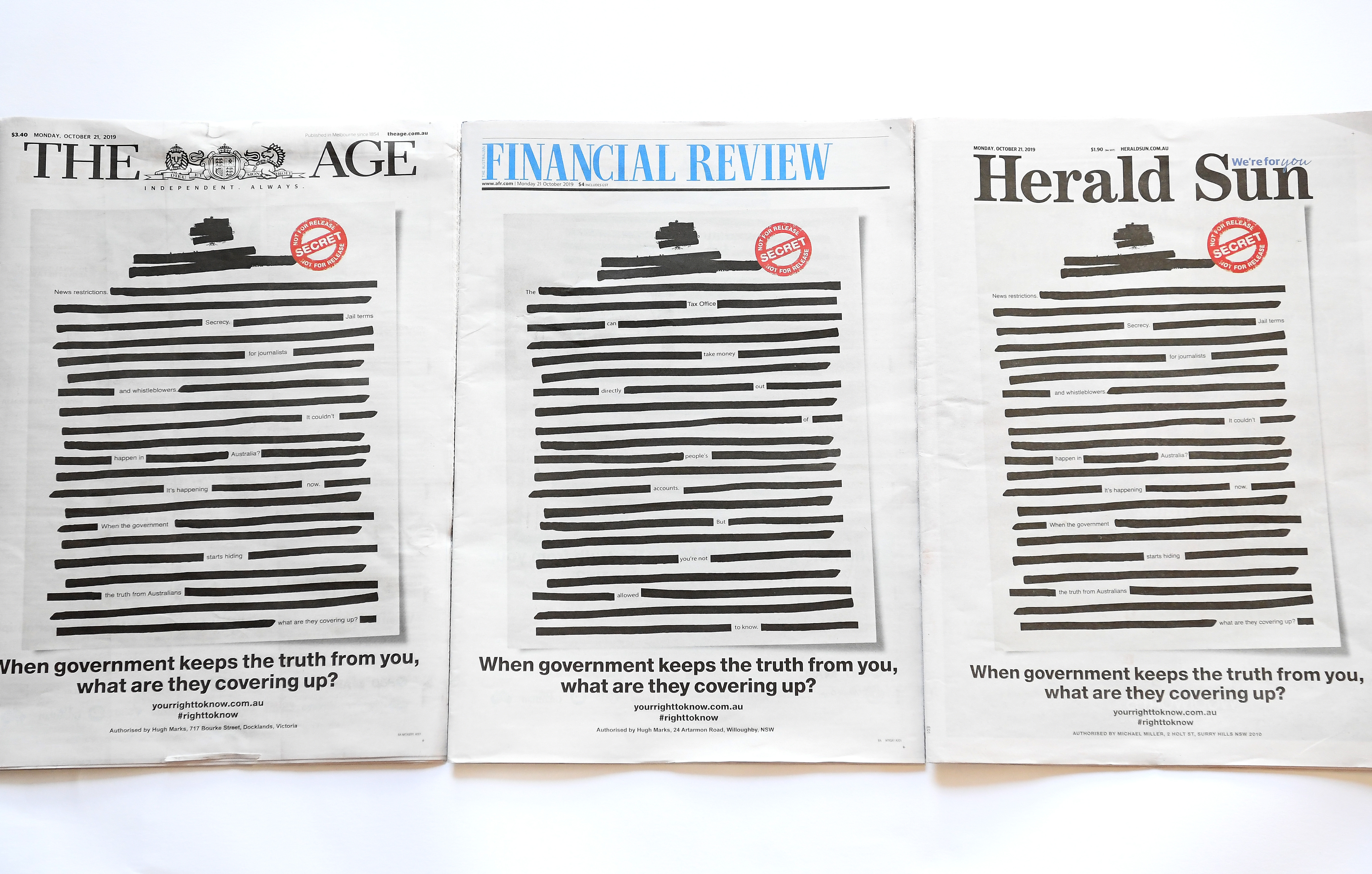Why Australia’s newspapers are blacking out their front pages
Media companies set aside rivalry to protest against government secrecy laws

A free daily email with the biggest news stories of the day – and the best features from TheWeek.com
You are now subscribed
Your newsletter sign-up was successful
Australia’s leading national and regional newspapers published blacked-out front pages on Monday in protest against government-sanctioned restrictions on press freedoms in the country.
In what the BBC calls a “rare showing of unity”, publications including The Sydney Morning Herald and The Australian ran special “redacted” covers in order to highlight the constraints on media organisations under strict national security legislation.
As The Independent reports, the front pages were “made to look like the copy had been censored in a similar manner to classified government documents”, with a message beneath asking: “When the government keeps the truth from you, what are they covering?”
The Week
Escape your echo chamber. Get the facts behind the news, plus analysis from multiple perspectives.

Sign up for The Week's Free Newsletters
From our morning news briefing to a weekly Good News Newsletter, get the best of The Week delivered directly to your inbox.
From our morning news briefing to a weekly Good News Newsletter, get the best of The Week delivered directly to your inbox.
As well as newspapers, the so-called Right To Know coalition also includes broadcast news networks such as the Australian Broadcasting Corp (ABC), which says the campaign is aimed at securing “the decriminalisation of public interest journalism, and greater protection for the media and whistle-blowers”.
The media outlets first teamed up to protest against the government after police raided ABC’s Sydney headquarters and the Canberra home of a News Corp journalist in June over articles that had relied on leaks from whistle-blowers. “One detailed allegations of war crimes, while the other reported an alleged attempt by a government agency to spy on Australian citizens,” says the BBC.
The legality of the raids is being challenged in Australia’s high court.
Meanwhile, the government said on Sunday that three journalists may face prosecution over the leaks.
A free daily email with the biggest news stories of the day – and the best features from TheWeek.com
The Guardian - the Australian arm of which is taking part in the campaign - reports that the Australian parliament has passed more than 60 laws relating to secrecy and spying in the past 20 years. Sky News cites examples including the government’s “refusal to disclose which nursing homes haven been found to abuse and neglect elderly residents”, and how much agricultural land has been sold to foreign entities.
Nor does Australia require real-time disclosure of political donations.
An investigation by Guardian Australia in 2018 found that the Tasmanian Liberal party received a $500,000 (£265,000) donation from the gambling lobby before the 2018 election, in which the rival Labor party campaigned on an anti-gambling platform. The Liberal party won the election.
Applauding the media’s protest campaign, News Corporation Australia’s executive chair Michael Miller said: “Australians should always be suspicious of governments that want to restrict their right to know what’s going on.”
ABC managing director David Anderson added: “Australia is at risk of becoming the world’s most secretive democracy.”
But Australian Prime Minister Scott Morrison has insisted that while press freedom is important to Australia’s democracy, the “rule of law” needs to be upheld.
“That includes me, or any journalist, or anyone else,” Morrison said on Sunday.
-
 How the FCC’s ‘equal time’ rule works
How the FCC’s ‘equal time’ rule worksIn the Spotlight The law is at the heart of the Colbert-CBS conflict
-
 What is the endgame in the DHS shutdown?
What is the endgame in the DHS shutdown?Today’s Big Question Democrats want to rein in ICE’s immigration crackdown
-
 ‘Poor time management isn’t just an inconvenience’
‘Poor time management isn’t just an inconvenience’Instant Opinion Opinion, comment and editorials of the day
-
 Epstein files topple law CEO, roil UK government
Epstein files topple law CEO, roil UK governmentSpeed Read Peter Mandelson, Britain’s former ambassador to the US, is caught up in the scandal
-
 Iran and US prepare to meet after skirmishes
Iran and US prepare to meet after skirmishesSpeed Read The incident comes amid heightened tensions in the Middle East
-
 Israel retrieves final hostage’s body from Gaza
Israel retrieves final hostage’s body from GazaSpeed Read The 24-year-old police officer was killed during the initial Hamas attack
-
 China’s Xi targets top general in growing purge
China’s Xi targets top general in growing purgeSpeed Read Zhang Youxia is being investigated over ‘grave violations’ of the law
-
 Panama and Canada are negotiating over a crucial copper mine
Panama and Canada are negotiating over a crucial copper mineIn the Spotlight Panama is set to make a final decision on the mine this summer
-
 Why Greenland’s natural resources are nearly impossible to mine
Why Greenland’s natural resources are nearly impossible to mineThe Explainer The country’s natural landscape makes the task extremely difficult
-
 Iran cuts internet as protests escalate
Iran cuts internet as protests escalateSpeed Reada Government buildings across the country have been set on fire
-
 US nabs ‘shadow’ tanker claimed by Russia
US nabs ‘shadow’ tanker claimed by RussiaSpeed Read The ship was one of two vessels seized by the US military